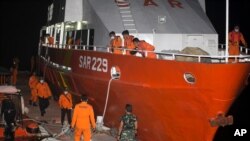A search for an Indonesian submarine that went missing with 53 people on board continued Thursday after rescuers found an oil spill near where the vessel dived and as neighboring countries pledged to help.
The 44-year-old submarine KRI Nanggala-402 was conducting a torpedo drill in waters north of the island of Bali on Wednesday but failed to relay the results as expected, a navy spokesperson said.
An aerial search found an oil spill near the submarine's dive location, and two navy vessels with sonar capability have been deployed to assist in the search, the Defense Ministry said.
A ministry statement said that requests for assistance had been sent and Australia, Singapore and India had responded.
Australian defense forces would "help in any way we can," Foreign Minister Marise Payne told ABC radio on Thursday.
"We operate very different submarines from this one, but the Australian Defence Force and Australian Defence Organisation will work with defense operations in Indonesia to determine what we may be able to do," Payne said.
Indonesia's military chief Hadi Tjahjanto told Reuters in a text message on Wednesday that contact with the vessel was lost at 4:30 a.m. and a search was under way for the submarine and its 53 crew members in ocean 96 kilometers off Bali.
In a statement, the Indonesian Navy said: "It is possible that during static diving, a blackout occurred so control was lost and emergency procedures cannot be carried out and the ship falls to a depth of 600-700 meters."
The submarine was built to sustain pressure at a maximum depth of around 250 meters, an official said.
The oil spill found on the surface could indicate damage to the vessel’s fuel tank, or it could be a signal from the crew, the navy said.
The military chief will hold a media briefing in Bali about the search on Thursday, a spokesperson said.
The 1,395-tonne KRI Nanggala-402 was built in Germany in 1977, according to the defense ministry, and joined the Indonesian fleet in 1981. It underwent a two-year refit in South Korea that was completed in 2012.
Indonesia once operated a fleet of 12 submarines bought from the Soviet Union to patrol the waters of its sprawling archipelago.
But now it has a fleet of only five, including two German-built Type 209 submarines and three newer South Korean vessels.
Indonesia has been seeking to modernize its defense capabilities, but some of its equipment is old, and there have been deadly accidents in recent years.





